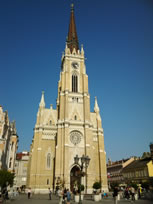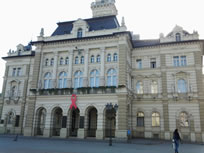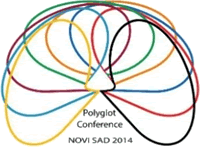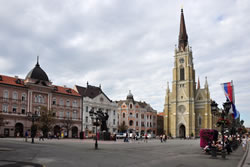Bloavezh mat / Šťastný nový rok / Blwyddyn newydd dda i chi i gyd / Einen guten Rutsch ins neue Jahr / Happy New Year to you all / Bonne année / Athbhliain faoi mhaise daoibh / Blein Vie Noa / Bliadhna mhath ùr / Blydhen Nowydh Da / С Новым Годом / Срећна Нова Година!
Category: Serbian (српски / srpski)
Happy New Year!
Bloavezh mat / 新年快樂 / Blydhen Nowydh Da / Šťastný nový rok / Gelukkig Nieuwjaar / Happy New Year / Bonne année / Einen guten Rutsch ins neue Jahr / Athbhliain faoi mhaise daoibh / Felice anno nuovo / 新年おめでとうございます / Blein Vie Noa / Feliz Ano Novo / С Новым Годом / Bliadhna mhath ùr / Срећна Нова Година / ¡Feliz Año Nuevo! / Gott nytt år / Blwyddyn newydd dda, and so on!
Polyglottery

Yesterday morning I met up with other conference participants and after a bit of a wander around the city, we had lunch then went to the opening ceremony a reception. In the after we had a little guided tour of Novi Sad seeing some interesting buildings, including the Catholic or Orthodox Cathedrals, and the fortress. There are some rather attractive buildings here, wide, pedestrianised café-lined streets, some nice parks and generally a relaxed kind of atmosphere.
In the evening we all went to a restaurant about 4 or 5km from the city centre for dinner. I walked there with a few others, and the rest went by bus or taxi. We had a nice dinner with lots of polyglot chat, then some people started dancing, and others carried on chatting.

Today there were lectures and talks on a variety of topics including sound symbolism, the magic of metaphors, language coaching, and acting and humour in a foreign language.
So far I’ve had conversations in about 10 languages and spoken bits and pieces of maybe 10 others. In some cases this was only a few words (all I know), in others it was a bit more. There are even two guys here who are learning Scottish Gaelic, one of whom also speaks a bit of Manx, and another who is learning Irish.
Novi Sad
There are various polyglot activities scheduled for this afternoon and evening, and talks and lectures start tomorrow, so I have this morning free. I plan to do a bit of work on Omniglot, and will try to meet up with other people who are here for the conference.
Unlike in Berlin, where most people stayed in a large hostel and the polyglot gathering was in the same place, here in Novi Sad things are a bit more spread out – we are staying in various hotels around the city and the conference is taking place in a cultural centre. My hotel doesn’t have a restaurant and breakfast is available at a café round the corner.
It seems that smoking is permitted inside in some places here – ugh! Since the smoking ban came into force in the UK I’ve tried to avoid visiting places where indoor smoking is still allowed. I didn’t check before coming here and might not have come if I’d known. At least the weather is warm and sunny so I can sit outside and avoid most of the smoke.
I’ve spoken a bit of Serbian so far, and found that some people in hotels and restaurants speak English as well. Last night I shared a taxi from Belgrade to Novi Sad with one of the other conference participants – a Polish guy with Vietnamese roots. We talked mainly in French, with a bit of Spanish, English and Russian thrown in for good measure. The taxi driver spoke only Serbian, plus a bit of Russian and German, and I struggled to explain to him that one of the people who was supposed to be with us had missed his connection in Zurich, due to a delayed flight from London, and would be arriving later.
Polyglot Conference

Tomorrow I’m off to a polyglot conference in Novi Sad in Serbia. It will be my first visit to Serbia, and my first opportunity to speak Serbian – I’ve been learning a bit more or less every day for the past month or so, but have yet to use it, so it’ll be interesting to find out how much I can say and understand. I’ll get to speak many other languages as well, and am really looking forward to it.
Are any of you going to the conference?
Patterns
Recently I’ve been learning Serbian, Russian and Czech with free apps produced by Hallberg Ryman, who make them for quite a variety of languages for Andriod and iPhone/iPad. They are working well for me and I would definitely recommend them.
They use a flashcard/SRS-based system to teach you vocabulary arranged into categories such as numbers, colours, clothing, food, etc. Within each category you learn individual words, and then see them in various sentences, which you’re tested on by filling in blanks, or by assembling sentences from a bunch of random words.
One blank filling exercise involves typing the missing words – in the other you just select the words – and I find this the most difficult, especially for Russian. It is also the most useful because I have to think about spelling and the grammar.
The other day I was doing a lesson on colours in Czech and in the typing exercise was having trouble remembering the endings for each word. I tried to memorise them for each sentence, but found this tricky, then I thought that there must be a pattern to them. I soon realised that they were agreeing with the gender of the nouns they accompanied. Once I spotted the pattern, it was easy to remember and apply it. I’m sure this aspect of Czech grammar has come up before in my Czech studies, but I hadn’t internalised it. Now that I’ve worked it out for myself through observation and experiment, I won’t forget it.
When learning grammar, are you able to take it in and remember it just from grammatical descriptions, or do you need to see lots of examples?
српски (Serbian)
Last week I started learning Serbian (српски) in preparation for the Polyglot Conference in Novi Sad in Serbia in October. Whenever I visit a country whose language I don’t already speak I learn at least the basics of their language, so I couldn’t go to Serbia without learning some Serbian.
I’m using online materials, such as Serbian Lessons and an app I download to my web tablet – any suggestions for other online resources would be welcome. I am listening to online Serbian radio most days as well.
I’ll be trying some of the language learning methods discussed in Gabriel Wyner’s book, Fluent Forever, which I started reading recently.
I will also be making little videos using the Serbian I’m learning. Here’s the first one:
If you speak Serbian and spot any mistakes in the dialogue or subtitles, please let me know.
A bit of Serbian
This is a little video I made featuring a couple of simple dialogues in Serbian. I started learning Serbian this week in preparation for the Polyglot Conference in Novi Sad in Serbia in October – I try to learn at least a little of the language of any country I visit – and I plan to make more videos like this to practise using what I’m learning.
Oideas Gael
I’m having a wonderful time in Gleann Cholm Cille learning to play the harp and speaking plenty of Irish. The course is going really well – we started with basic techniques, and have learnt a number of tunes, including some from the Bóroimhe / Brian Boru suite by Michael Rooney.
I’ve videoed our teacher, Oisín Morrison, playing all the pieces we’ve learnt so far, and he’s going to give us some more pieces to learn at home.
People come here from all over the world on holiday and to do courses at Oideas Gael – this week you can do Irish language classes, harp playing, or hill walking – so there are opportunities to speak quite a few languages, including French, German, Swedish, Mandarin, Dutch and Scottish Gaelic. I’ve even learnt a bit of Serbian from a Bosnian woman who is studying Irish here.
Novi Sad

As I’m going to the Polyglot Conference in Novi Sad (Нови Сад) [nôʋiː sâːd] in October, I thought I should find out what Novi Sad actually means – it’s the kind of thing I like to know. I guessed that Novi probably means new, but had no idea what Sad might mean.
According to this dictionary, нови means new and сад means ‘plantation’.
Wikipedia translates the name as ‘New Garden’, and gives versions of the name in a number of languages used in local administration:
– Serbian: Нови Сад, Novi Sad
– Hungarian: Újvidék (‘new territory/region/land’)
– Slovak: Nový Sad
– Rusyn: Нови Сад (Novi Sad)
In Latin it’s known as Neoplanta, and as Novi Sad in Croatian and Romanian.
The word сад / sad comes from the Proto-Slavic *saditi (to plant), and means vessel, container or dish in Macedonian; garden, orchard or park in Russian and Ukrainian; orchard in Czech and Polish; fruit in Lower Sorbian; and garden, orchard or plantation in Slovak.
Sources: http://en.wiktionary.org/wiki/сад and http://en.wiktionary.org/wiki/sad